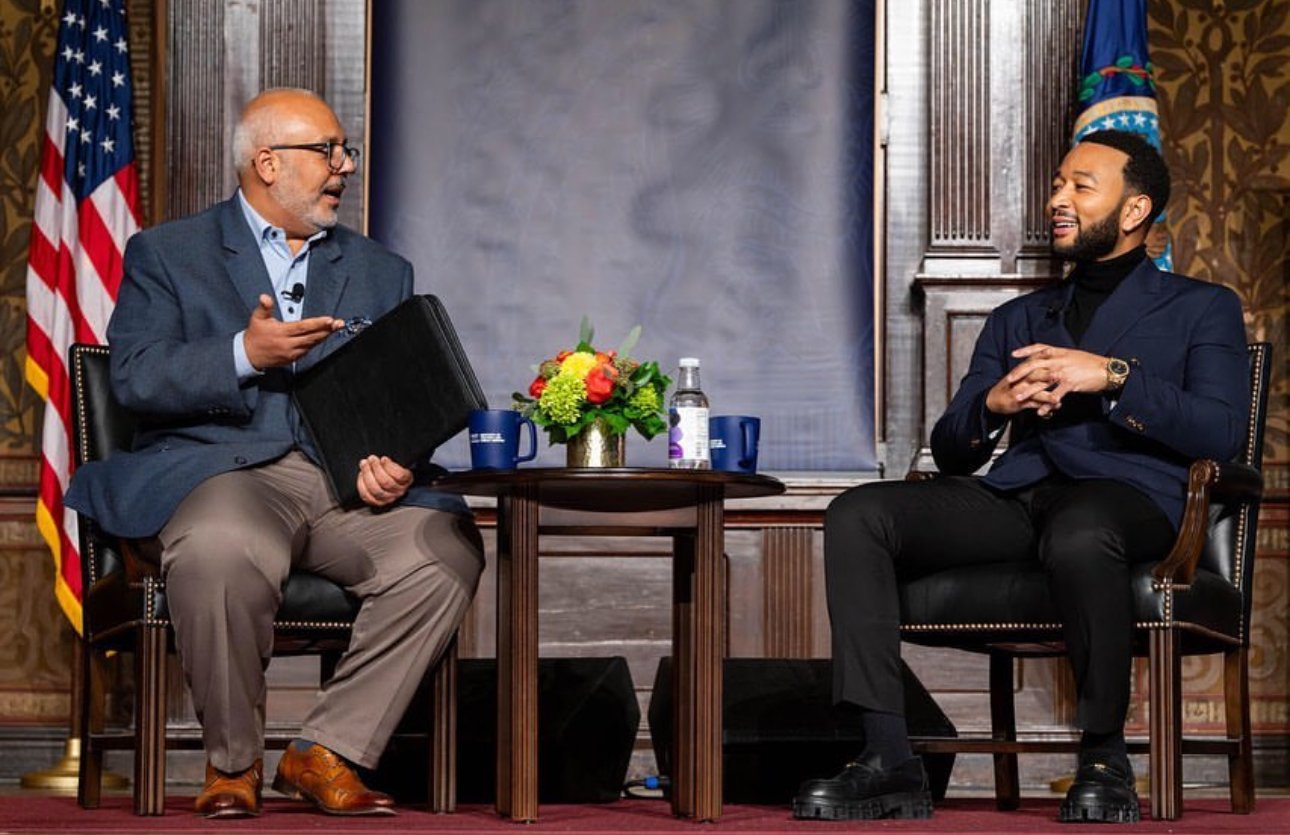John Legend Discusses Using his Platform as an Instrument for Change
Photo via GU Politics
JUSTIN HIGGINS: On Thursday October 24, Georgetown’s Institute of Politics and Public Service (GU Politics) welcomed EGOT-winning, multi-platinum artist John Legend to Gaston Hall as part of the GU Politics speaker series “Know Your Power.” Moderated by Mo Elleithee, the executive director of GU Politics, the pair discussed Legend’s involvement with social justice in a time where activism plays a large role in voter decision-making.
The talk drew a large crowd of students, faculty, friends of John Legend, and even current senators, as Senator Laphonza Butler (D-Calif.) was in attendance for the chat.
Elleithee and Legend opened by discussing an excerpt from an essay Legend wrote in his youth. At 15, Legend said he wrote an essay for a national competition titled, “How I Plan to Make an Impact on Black History.” Back then, he noted that his writing had the intent to develop his own character while being a leader in his community, hoping to use his “social skills and musical talents to be a positive role model for [his] fellow Afro-Americans. Legend envisioned a “successful musical career that will allow [him] to obtain high visibility” a stepping stone to what a young Legend hoped would enable him to contribute to the advancement of black people in America.
Legend’s inspirations in his experiences with social justice are not limited to Civil Rights icons like Dr. Martin Luther King Jr. and Rosa Parks. He attributes his inspiration to artists as well, such as Harry Belafonte, Nina Simone, Aretha Franklin, Stevie Wonder, and Marvin Gaye, whose songs were not only soundtracks for various marches and protests but who positioned themselves as leaders that used their platforms and resources to contribute to political activism.
Flashing forward to the present day, it is fair to say that Legend has surpassed the goals that he set for himself in his teenage years, replicating the duality of social justice and music that he once admired.
John Legend is the founder of FREEAMERICA, an initiative aimed at ending mass incarceration; HUMANLEVEL, a partnership with the Brookings Institution that works with local governments and community members to address racial inequality; and Get Lifted Film Co., which elevates underrepresented voices across film, television, and other entertainment industries.
He also co-wrote the song Glory, which won an Academy Award, Golden Globe, and a Grammy. Legend explained how the lyrics of the song reference the Civil Rights fights of the past while drawing clear parallels to the then, present day: Glory went on to become a rallying cry in Ferguson, Missouri in the wake of the Michael Brown murder.
While explaining the unseen preparation for each of his initiatives, Legend stressed the importance of local government in decision-making, especially towards marginalized communities: “A lot of the issues that we care about and that have a huge impact on a lot of the people that we are fighting for are locally determined…we wanted to have voices in local government who are focused on equity and using the resources of local government to empower people who have been marginalized.” Legend continued, saying that a more recent project in forming FREEAMERICA was educating the public on the role of a District Attorney and helping elect more progressive prosecutors. In fact, back in 2020, John Legend actually joined Senator Bernie Sanders (D-Vt.) in endorsing a progressive challenger who sought to unseat a longtime incumbent in my local District Attorney’s race in Albany, NY.
Despite his commitment to driving change in local government, the talk concluded with a discussion about the upcoming presidential election, before Legend began taking questions from students. Referencing Legend’s strong surrogacy for the Harris Walz campaign, moderator Elleithee joked to Legend “You’re not just singing,” to which Legend quipped, “Oh, I’m talking!”
Legend went on to explain that the connection between politicians and justice compelled him to go “all in” in this election. “I grew up with an understanding of how our politicians have a role in bringing us closer to justice, and how having the right politicians in place enables movements to be either successful or fail.”
When pressed by Elleithee about the narrative that Kamala Harris, who would be the first black woman to serve in the nation’s highest office, is struggling with capturing the votes of black men compared to her predecessors, Legend provided context. “Black men are going to vote for Kamala Harris more than any other demographic group in the nation, except for black women. So, we will not be the reason she loses if she does.” This statement brought applause from attendees, as Legend continued on, citing that at minimum, 80% of black men will be voting for Harris and calling on other demographics to turn out in similar numbers for the candidate.
At the conclusion of the talk, Legend took questions from student attendees. He called on the Georgetown community to be “open and empathetic, and remember that “there are so many ways to make a difference in so many different places,” reminding students that “there’s more to getting involved and making a difference than what’s happening in DC.”
Justin Higgins is a staff writer from Albany, New York. He is a first year in the College majoring in Government and minoring in Journalism.

